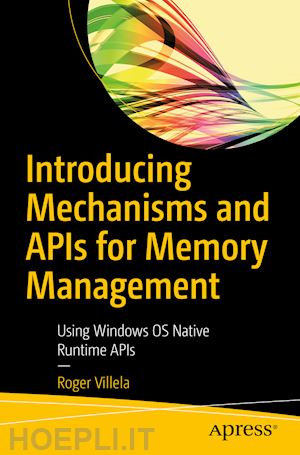

Questo prodotto usufruisce delle SPEDIZIONI GRATIS
selezionando l'opzione Corriere Veloce in fase di ordine.
Pagabile anche con Carta della cultura giovani e del merito, 18App Bonus Cultura e Carta del Docente
Explore and learn introductory topics about programming mechanisms for memory management available for Microsoft Windows. This book uses C++ pointers and specialized APIs such as the smart pointers of the C++ Standard Library and Microsoft UCRT functions. You’ll also see how to work with lvalue and rvalue references.
Introducing Mechanisms and APIs for Memory Management begins with topics about hardware features on the Intel x86 and Intel 64 (x64/amd64) hardware architectures and memory management. After reading this book you will be able to begin work with Windows memory management APIs.
Roger Villela is a software engineer and entrepreneur with almost 30 years of experience in the industry and works as an independent professional. Currently, he is focused in his work as a book author and technical educator and is specialized in the inner works of orthogonal features of the following Microsoft development platforms:
- Microsoft Windows operating system base services.
- Microsoft Universal Windows Platform (UWP).
- Microsoft WinRT.
- Microsoft .NET Framework implementation of the runtime environment (CLR).
His work is based on the Microsoft Visual Studio (Microsoft Windows) and Intel Parallel Studio XE (Microsoft Windows), using the following programming languages, extensions, and projections:
- C/C++- Assembly (Intel IA-32/Intel 64 (x64/amd64))
- Component Extensions for runtimes (C++/CLI and C++/CX).











Il sito utilizza cookie ed altri strumenti di tracciamento che raccolgono informazioni dal dispositivo dell’utente. Oltre ai cookie tecnici ed analitici aggregati, strettamente necessari per il funzionamento di questo sito web, previo consenso dell’utente possono essere installati cookie di profilazione e marketing e cookie dei social media. Cliccando su “Accetto tutti i cookie” saranno attivate tutte le categorie di cookie. Per accettare solo deterninate categorie di cookie, cliccare invece su “Impostazioni cookie”. Chiudendo il banner o continuando a navigare saranno installati solo cookie tecnici. Per maggiori dettagli, consultare la Cookie Policy.